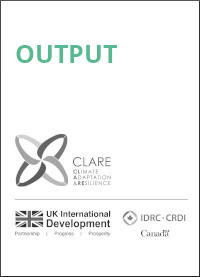RECOVER – Resilience to climate vulnerability and environmental risk – focus on small islands
Introduction:
Small Island Developing States (SIDS) are on the frontlines of climate change and consistently rank high on a range of risk and climate vulnerability indices. IPCC’s Sixth Assessment Report recognizes the urgency of these challenges and the need for transformational adaptation strategies for small islands.
Responding to this need, the RECOVER project is an innovative, timely and needs-driven North-South initiative aimed at addressing climate change adaptation through a multi-risk and multi-sector approach. By conducting pilot projects in three small island states—Maldives, Mauritius, and Seychelles—we refer to as “hubs of innovation”, scalable and systems-changing climate resilience approaches will be co-developed to enhance understanding of small island climate adaptation capacities and possibilities. The pilot projects will be conducted by implementing partners in activity countries: Maldives National University, University of Mauritius and Sustainability for Seychelles (S4S).
Background:
Often referred to as ‘canaries in the climate change coal mine’ due to their sensitivity to climate change risks, small islands are facing increasingly frequent and intense extreme weather events, changing precipitation patterns, and threats from future sea-level rise. These events, such as tropical cyclones, often cause significant infrastructure damage, disrupting critical food, water, and energy supplies. Due to their size and tight socioeconomic and environmental coupling, small islands can quickly reach tipping points, making recovery from climatic shocks prolonged or limited. Even minor natural or anthropogenic events can lead to cascading impacts, causing systems to shift to different operational states characterized by instability and detrimental effects on island residents and ecosystems.
RECOVER Framework:
The IPCC (2022) highlights that the adaptive actions of small islands are insufficient to match the risks they face. There is a pressing need for system-level transformations that address the fundamental, long-term changes required for sustainable island economies and recognize the intertwined nature of climate change and gender.
RECOVER views the vulnerability of small islands from the lens of “socio-metabolic risk”. Socio-metabolic risk is systemic risk concerned primarily with the availability, integrity, and circulation of critical resources (e.g., materials, energy, water) necessary for societal wellbeing. Socio-metabolic risk is to islands as circulatory health problems are to humans – both constrain the entity’s ability to withstand significant shocks and changes. Maladaptive and climate insensitive development practices – such as coastal squeeze, high import dependency, and centralised energy systems – magnify islands climate vulnerability. Mitigating socio-metabolic risk is crucial for small islands to withstand climate impacts and avoid cascading dysfunction of environmental, economic, and social systems.
RECOVER’s framework responds to the need for a systems-based approach by combining socio-metabolic research (SMR) and nature-based solutions (NBS) to support small island economies in increasing resource self-reliance, reducing vulnerability to climate risks, and enhancing climate adaptation capacity.
RECOVER’s objectives will be met through multisectoral partnerships, combined scientific excellence of multiple disciplines. Real-World Labs (RWLs) will engage stakeholders in co-creating knowledge and developing place-based solutions. They enhance transformative capacity in small islands by promoting inclusive development, building partnerships, and creating communities of practice.
Together, these components of the RECOVER framework aim to create sustainable and adaptive strategies for small islands facing climate change. By addressing socio-metabolic risks and leveraging nature-based solutions, RECOVER seeks to implement system-level transformations that ensure long-term resilience and sustainability for small island economies.
Objectives:
Specific objectives of the project are:
- Design an evidence-based road map for embedding circularity principles at island scales to support a transition from a linear to a circular metabolism through SMR and risk modelling;
- Propose climate resilient business models based on circular economy (CE) principles and increase self-reliance on critical resources such as food, energy, and construction materials;
- Develop and implement a common framework to aid understanding of socio-metabolic risks associated with water metabolism through socio-hydrology studies for designing CC adaptation solutions;
- Identify the potential for enhancing wellbeing with lower material and energy demands by integrating nature-based solutions with material stocks-flow-service (SFS) nexus thinking;
- Engage stakeholders in Real World Labs (RWLs), thus embedding social and environmental justice within SMR, with particular emphasis on transformational evaluation practices and inclusion of vulnerable and underrepresented groups.
Contacts:
Simron Jit Singh (Principal Investigator): simron.singh@uwaterloo.ca
Photo Credit: Simron Jit Singh
Lead Organizations
CLARE Partners
Contacts


